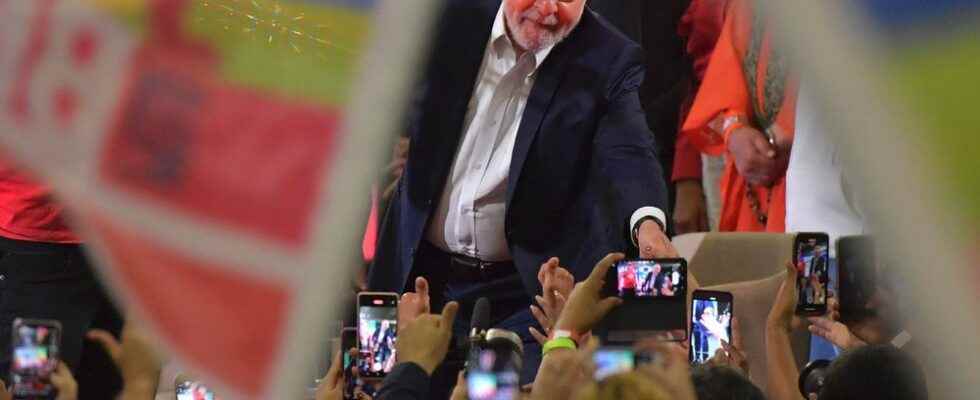Lula now gives him “comrade Geraldo”. Because here they are allies, sixteen years after having clashed at the polls. Geraldo Alckmin, 69, will be the running mate of Luiz Inácio Lula da Silva, who governed Brazil between 2003 and 2011 and is in the lead for the presidential election on October 2 against Jair Bolsonaro. After the cancellation of his convictions for corruption, the candidate of the Workers’ Party (PT) regained his eligibility. And the ardor with which this tenor of the right exalts her now ready to smile.
At his side during a rally on April 14, he became hoarse from chanting “Vive Lula” and flattering the unions with which this former governor of the powerful state of São Paulo had an execrable relationship. Despite a long political career, this austere provincial doctor with the false airs of Jacques Chirac is not used to haranguing crowds.
When their pre-campaign kicked off on May 7, he joked about his supposed lack of charisma, which earned him the nickname “drunk with chuchu”, that is to say chayote ice cream, a tasteless vegetable. In Brazilian, Lula, diminutive of Luiz, also means squid. “Squid goes well with chayote, this dish could even become the ‘hit’ of our kitchen”, launched “Geraldo”, before adding: “When Lula held out his hand to me, I saw , beyond the gesture of reconciliation between two historical adversaries, an appeal to reason. He alone is capable of guaranteeing alternation, and therefore the maintenance of democracy, which will be put to the test in the next elections”. Won over, the audience gave him a standing ovation. The reservations inspired by this “neoliberal”, “ultraconservative” PT seemed suddenly forgotten.
Former President Luiz Inacio Lula da Silva, May 7, 2022 in Sao Paulo
afp.com/NELSON ALMEIDA
To facilitate his rallying, Geraldo Alckmin left the Brazilian Social Democracy Party (PSDB) of which he embodied the right wing. A practicing Catholic, who never leaves his beads, he is the politician closest to the influential Brazilian Church. Which is very useful. Thanks to his mediation, the episcopate gave up condemning the remarks of Lula, who had defended abortion – an absolute taboo in Brazil – before retracting. In 2006, the magazine Epoca revealed Alckmin’s links with Opus Dei, a sulphurous Catholic organization sometimes presented as a “holy mafia”. Initiation sessions are said to have been held secretly at the Bandeirantes Palace, the seat of the Paulista government. The interested party denies.
“Geraldo Alckmin is a true statesman”
If he is the favorite, with 46% of the voting intentions against only 29% for Bolsonaro, Lula knows that this sixth campaign will be the most difficult. For the first time, his adversary can, like him, take advantage of popular roots. The boss of the left therefore needs the broadest possible coalition. It was this republican front that was lacking on the left in 2018 when Jair Bolsonaro won against Fernando Haddad, Lula’s colt then in prison. “Anti-PT sentiment was too strong at the time to hope for a rallying of the conservatives, analyzes the academic Frédéric Louault. Lula, he is able to tear himself away from his party to gather “. According to political scientist Josué Medeiros, he is looking to win in the first round: “The bigger and clearer the victory, the more difficult it will be for Bolsonaro and his supporters to contest it.”
In this strategy, comrade Geraldo’s role consists in convincing the moderate right, which brought to power the ex-military man nostalgic for the dictatorship (1964-1985) but who now abhors him, to vote for Lula. Four years ago, faced with the divisions of his party, the same Alckmin, then PSDB candidate, had refrained from giving a voting instruction against the leader of the far right who had siphoned off his votes. with less than 5% of the vote, an unprecedented defeat, he stepped back, devoting himself to training in acupuncture and delivering his “well-being” tips on TV. “By joining Lula, continues the political scientist Medeiros, he is back in the political game.” Figures from the PSDB are following in his footsteps, to the chagrin of João Doria, the candidate of their own party.
The moment that the young Brazilian democracy has been waiting for nearly four decades may have arrived. Both born of the struggle against the dictatorship, the PT and the PSDB became, after the return to democracy, enemy brothers instead of joining forces in a sort of Chilean-style “Concertación”. Since 1994, the two parties have been vying for the head of the state which they have governed in turn, first with the PSDB of Fernando Henrique Cardoso (1995-2003) then with the PT until his dismissal in 2016 of Dilma Rousseff, the “heiress” of Lula. The meteoric rise of Jair Bolsonaro put an end to this polarization. After Alckmin’s rallying, the PT negotiated that of other figures of the PSDB’s historical current. “We are no longer in a left-right dispute but between civilization and barbarism, insists the jurist Pedro Estevam Serrano, of the supra-partisan collective Prerrogativas. Geraldo Alckmin, who is a true statesman, is aware of the risks incurred if Bolsonaro is reelected.”
